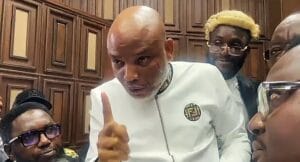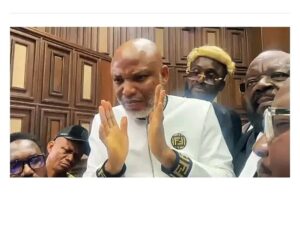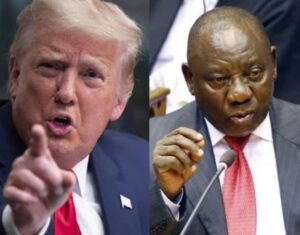Elon Musk has unexpectedly become political advertising’s new rising star as Democrats use his cost-cutting influence in the Trump administration to energize voters and donors. From Virginia to Wisconsin, political ads and fundraising campaigns highlight Musk’s role in federal spending cuts, aiming to sway public opinion.
A major Democratic organization recently launched advertisements in nearly two dozen House races, portraying Republican incumbents as prioritizing billionaires like Musk over essential services such as healthcare for children and seniors. These ads feature Musk wielding a chainsaw—a moment captured during the Conservative Political Action Conference—symbolizing aggressive budget reductions led by the Department of Government Efficiency.
Beyond congressional races, Musk’s image appears in digital ad campaigns supporting Virginia’s House Democratic Caucus and judicial races in Wisconsin. The growing focus on him raises a critical question: Will Musk’s prominent role in government downsizing become a liability for Republicans, or will it energize conservative support?
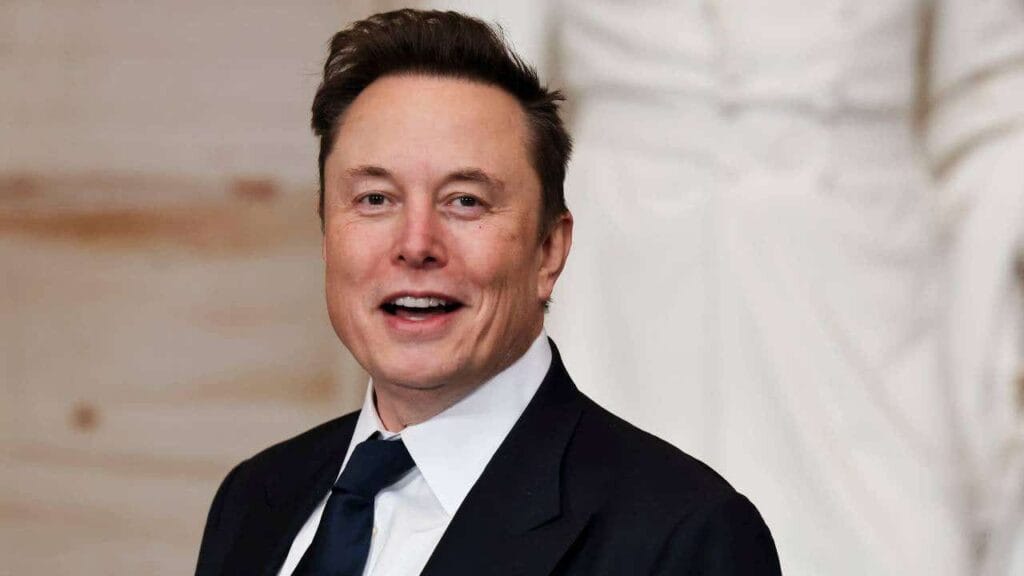
A Convenient Political Target
Musk’s growing presence in political ads reflects his increasing influence in government decisions. Lynda Tran, a Democratic strategist, explains, “He’s dominating the conversation. Whether people like it or not, his name is constantly in the headlines.”
Recent polls suggest that Musk is viewed unfavorably, particularly among Democratic voters. A Marist/NPR/PBS national poll conducted in late February found that 50% of respondents held an unfavorable opinion of Musk, while only 39% viewed him positively.
Another Quinnipiac University poll revealed stark differences along party lines:
- 96% of Democrats believe Musk holds too much power.
- Only 16% of Republicans share that concern.
These findings suggest that Musk’s image as a billionaire cutting government jobs and programs resonates differently across political groups.
For many, Musk represents corporate wealth influencing public policy. Democratic strategist Jesse Ferguson notes, “To some Americans, he’s the face of job losses—someone who cut their uncle’s position or moved their cousin’s job overseas.”
Trump and Musk: A Strategic Partnership
Despite the backlash, Musk remains a key figure in the Trump administration. During his recent joint address to Congress, Trump publicly acknowledged Musk’s efforts to reduce government waste. Sitting in the gallery, Musk received praise for identifying unnecessary spending.
However, some Democratic lawmakers protested. Texas Representative Al Green, who was later censured by the House, voiced strong opposition to Musk’s involvement in shaping national policies.
The White House, however, defended Musk. Spokesperson Harrison Fields dismissed Democratic criticisms, stating, “Millions of Americans witnessed firsthand that the Democratic Party is out of touch with reality. The Department of Government Efficiency’s mission is widely supported, and Democrats need to acknowledge that.”
Still, Musk’s growing influence has sparked concerns within the administration. In response to public criticism, Trump imposed new restrictions on Musk’s authority, telling Cabinet members that staffing decisions now rest with department heads. Trump also called for a more precise approach to budget cuts, shifting from broad reductions to more targeted financial adjustments.
Musk’s Role in Fundraising and Elections
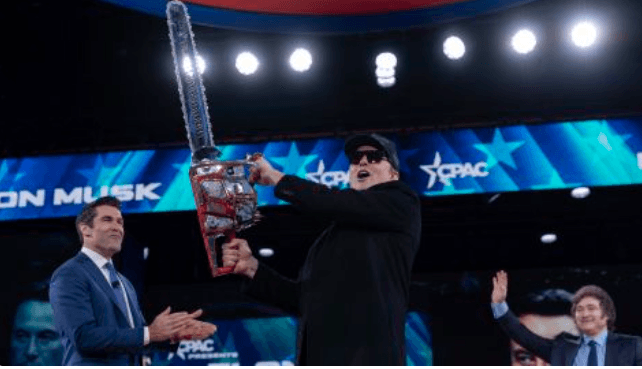
Musk’s financial backing significantly impacts political races, particularly in Wisconsin. His political action committee, America PAC, has already spent $3.2 million to support conservative candidate Brad Schimel in a state Supreme Court race. Another group associated with Musk, Building America’s Future, contributed an additional $2 million in advertisements and mailers.
This election holds national significance. If Schimel wins, control of Wisconsin’s Supreme Court could shift to conservatives, influencing decisions on key issues such as:
- Abortion laws dating back to the 19th century.
- Public-sector union rights challenged by legislation from 2011.
- Tesla’s legal battles over restrictions on car dealership ownership in Wisconsin.
Democrats Counter with Musk-Focused Ads
Democratic groups are countering Musk’s influence with aggressive advertising campaigns. The Wisconsin Democratic Party has launched a multimillion-dollar effort, including commercials, town halls, and an online platform titled People v. Musk.
Another organization, A Better Wisconsin Together Political Fund, is running ads that claim Musk is creating chaos in Washington and attempting to “buy” a judicial seat.
In response, liberal candidate Susan Crawford’s campaign has used Musk’s spending as a fundraising tool. Social media ads urge supporters to contribute, warning that Musk is funneling millions into the race.
Derrick Honeyman, Crawford’s campaign spokesperson, reports a surge in donations. “In just one week, we received over 36,000 grassroots contributions—more than what we raised in the previous seven months combined.”
Crawford’s campaign has also drawn support from prominent Democratic donors, including billionaire George Soros and Illinois Governor J.B. Pritzker. These contributions have bolstered the campaign’s ability to counteract Musk-backed spending.
However, Schimel’s team dismisses these efforts. Spokesperson Jacob Fischer accused Democrats of hypocrisy, saying, “Susan Crawford and her allies are distracting voters from her extreme views while benefiting from wealthy donors themselves.”
Virginia Democrats Take Aim at Musk
Virginia has become another battleground where Musk-focused messaging is shaping elections. Democrats hope to capitalize on voter frustrations, especially in areas with a high concentration of federal employees affected by Musk-driven job cuts.
State Delegate Dan Helmer, leading the House Democratic Caucus campaign, argues that Musk’s policies have devastated families. “He’s using a chainsaw on people’s lives—people who have dedicated decades to public service.”
Virginia is home to over 144,000 federal civilian workers, many of whom are feeling the impact of government downsizing. Democratic strategists believe tying Musk to Republican candidates will resonate with voters, particularly in competitive districts.
The state’s House of Delegates is narrowly divided, with Democrats holding 51 seats to Republicans’ 49. Their strategy involves targeting 12 Republican incumbents, particularly those in districts won by Kamala Harris in the 2024 presidential election.
The Risks of Targeting Musk
While emphasizing Musk’s role in government cuts may appeal to some voters, Democratic strategists acknowledge potential risks.
One concern is Musk’s unlimited financial resources. A Democratic strategist warned, “Targeting Musk might backfire. He has the means to pour even more money into elections.”
Another risk involves the effectiveness of anti-Musk messaging. While his unpopularity among Democrats is clear, he remains a respected figure among conservatives and business-minded voters.
A Key Focus in the Midterms
The upcoming midterm elections will further test the impact of Musk’s influence in political campaigns. House Majority Forward, a leading Democratic super PAC, recently launched ads targeting Republican lawmakers for failing to lower living costs while cutting healthcare programs.
These ads attempt to link GOP policies to Musk and recent House Republican votes supporting Trump’s budget plans. The Republican spending framework aims to save $880 billion over a decade, with Medicaid likely facing reductions. However, GOP leaders insist that savings will come from eliminating fraud and waste, not cutting direct benefits.
More than 20% of Americans rely on Medicaid, making healthcare a major election issue. The Democratic ads accuse Republicans of prioritizing tax breaks for the wealthy over protecting essential services.
In response, the National Republican Congressional Committee (NRCC) dismissed these claims. Spokesman Mike Marinella stated, “Democrats are resorting to fear tactics because they have no real message. Their strategy is based on deception.”
Conclusion
Political advertising’s new rising star has unexpectedly become Elon Musk. His involvement in government downsizing has made him a central figure in campaign messaging, fundraising, and voter outreach.
For Democrats, Musk represents corporate influence and drastic budget cuts that threaten essential services. For Republicans, he symbolizes efficiency, reduced government spending, and economic reform.
As the 2025 elections approach, both parties are betting that their portrayal of Musk will resonate with voters. Whether he becomes a political liability or an asset remains to be seen—but one thing is certain: Elon Musk’s role in politics is only growing.

